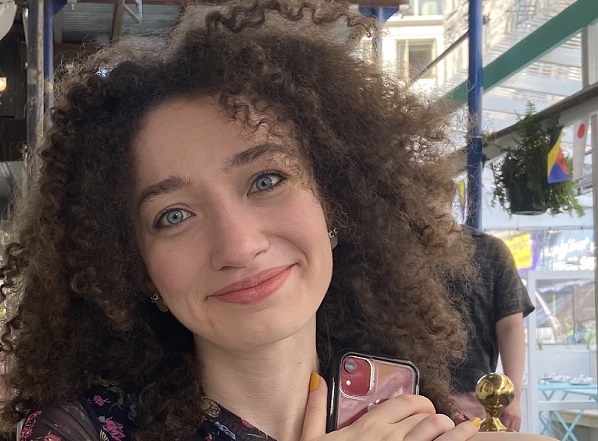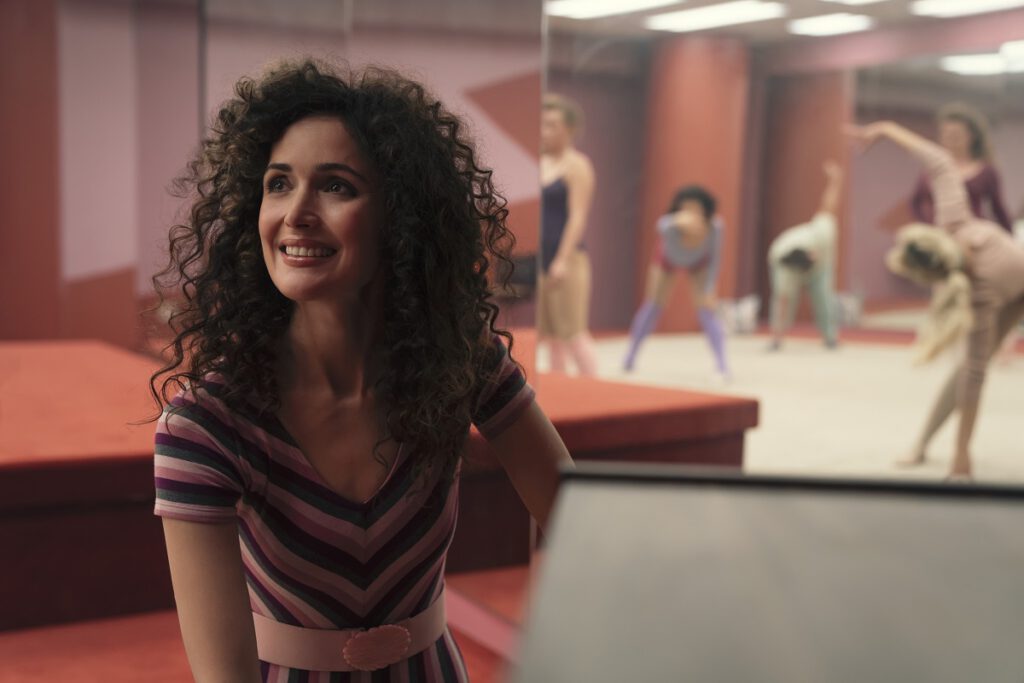It’s 1981, and frustrated housewife Sheila Rubin (Rose Byrne) has a lot of anger and no outlet for it. She and her husband, Danny (Rory Scovel), are 1960s socialists who have since suburbanized, settling down in San Diego. Danny, a shining star of the anti-Vietnam war movement now down-sliding into middle-aged mediocrity, teaches political science at a local college while Sheila stays home to run the household and take care of young daughter Maya. On the surface, Sheila’s life is going pretty well, but on the inside, she’s absolutely miserable from the unextraordinary pattern into which her life has fallen. Frustration and self-loathing express themselves in multifold ways throughout Sheila’s life, but most notably through an unhealthy relationship with food, as Sheila maintains a well-hidden habit of binging and purging, going so far as to rent a motel room for the afternoon to ensure no one stumbles upon her mid-cheeseburger binge. Every time, she hates herself for succumbing to her urges, but inevitably, the vicious cycle continues.
But then, Sheila stumbles upon something she doesn’t hate. She discovers aerobics at a studio in the newly-opened mall run by the mysterious bottle blonde Bunny (Della Saba) and her surfer boyfriend Tyler (Lou Taylor Pucci), an aspiring film director and a particularly grounded iteration of the himbo archetype that has been particularly in vogue as of late. Suddenly, Sheila has found something that enables her to run with her overwhelming instinct to push and punish herself in a way that she can do publicly and without shame—and, upon noticing the rise of VHS sales and putting two and two together, while turning a tidy profit.
The nature of Sheila’s frustrations are widely relatable even if their dark and twisted form is not quite so ubiquitous. No doubt there will be viewers who balk at Sheila’s vitriolic running monologue; nothing is spared from criticism, and no blow is too low. But for anyone who can identify with obsessive thinking tendencies, even in a much milder form, it’s painfully relatable, refreshingly honest, and more than enough to make Sheila’s journey engaging even if she is decidedly lacking in anything that would traditionally be deemed “likable” qualities. Her super-ego is a warped and wicked thing, unfailingly cruel in its judgements of everyone and everything. Sheila hates her life and everyone in it, but the most vicious barbs are those she points inwards. After Danny is let go by the college, Sheila’s tirade of less-than-complimentary thoughts about her husband ultimately proves to be a roundabout self-critique above all: “If he’s nothing, what are you?” Sheila’s often relentless running monologue is exhausting, and that’s the point; in a warped way it’s also one of the most compellingly daring aspects of the series.

Despite being akin to black coffee in its high-energy bitterness, “Physical” is still a part of the ’80s nostalgia wave—in love with spandex and brightly colored eyeshadow, shopping malls and food courts. Much like Sheila, the series itself gorges and purges on ’80s, hating itself all the while but also unable to keep from making multiple Betamax jokes. It might rely on needle drops of toe-tapping ’80s hits a little too much (“Space Age Love Song,” “We Belong,” “Atomic”), but then again, when was the last time something set in the ’80s didn’t succumb to this impulse?
Not only slightly late to the post-“Stranger Things” ’80s craze but also smack-dab in the middle of a wave of stories of frustrated housewives reaching a breaking point—premiering the very same week as AMC’s “Kevin Can F**k Himself”—”Physical” needs something to stand out after arriving rather late to the party, and the depths of Sheila’s psyche to which it dives certainly counts.
Rose Byrne does a remarkable job as Sheila. She’s shown her incredible range elsewhere and doesn’t disappoint here, bringing all the required intensity and then some. “Physical” isn’t afraid to lean into absurdity, and Byrne’s performance is able to convincingly sell situations that would sound like utter nonsense on paper. Overall, the cast does a great job, although some choices are a little eyebrow-raising: the only recurring Asian character is seductive co-ed Simone (Ashley Liao), and the lone Black character of note, an acquaintance of Tyler’s played by Jordan R. Coleman, is a con man. Their characters are sufficiently nuanced for it not to come across as fully distasteful so much as somewhat thoughtless, speaking to a larger trend of unevenness in the execution of the series. It’s hardly an unusual shortcoming, especially for first seasons, although “Physical” is an especially striking example.

The series’ writing, steered by creator Annie Weisman (“Desperate Housewives”), is compelling in terms of the flow of dialogue and the crafting of interesting, distinctive characters (for the most part—more on the exceptions later), but the structure feels a bit discombobulated overall. “Physical” does not seem truly aimless so much as pulled in many different directions. What the soul of the show is, exactly—or whether it even has one, to be frank—remains in question by the season finale, which is also the weakest episode in the bunch. It’s the sort of finale more focused on throwing curveballs and dropping bombs in a plea for a second season than culminating half the established storylines in any satisfying way.
The finale also dedicates a somewhat worrying amount of screen time to the show’s weakest link—an utterly baffling subplot involving parasitic real estate developer John Breem (Paul Sparks), a bogeyman who definitely just crept out from under some six-year-old’s bed. Breem is so bizarre and out of sync every time “Physical” takes a detour into his storyline it’s like stepping into “The Twilight Zone.” From context clues, one gathers that he’s supposed to be something of a seductive demon towards whom Sheila, in spite of hating nearly everything. His actual vibe is better described as a sexually repressed evangelical snapping turtle. It’s hard to tell if Sparks is slightly miscast here, or if the problem is entirely that the character is simply too weird to make work.
The stylized harshness director Craig Gillespie brings to the pilot episode bears a very strong resemblance to his work in “I, Tonya,” and later episodes directed by Liza Johnson and Stephanie Laing follow suit. The lighting is often unflattering, bestowing the cast with a clammy, wan, but visually striking pallor. Echoing Sheila’s disgust with basically everything, and especially her particularly toxic relationship with food, anything edible looks decidedly not—the less said about a fondue scene, the better. It’s as effective as it is unappetizing.

A very singular focus on Sheila in the first few episodes begs the question if this whole thing might have been better suited to a movie. Slowly but surely, though, the narrative opens up with mixed results. Bunny gets an intriguing if rushed backstory that is lost in the shuffle even more abruptly than how it’s thrown into the mix. Greta (Dierdre Friel), a fellow stay-at-home mom, makes for a fascinating foil to Sheila, and while the series resolves her season arc far too conveniently, it still feels like there’s plenty of interesting things that could be explored should the series return for another season.
While Apple TV+ has been very emphatic in marketing “Physical” as a comedy, let’s be clear—it’s not. Yes, I know what the press releases have said; we as an industry really need to have a nice long chat about what “comedy” actually means, and when it really ought to be used. The series represents a sufficiently engaging five hours total viewing, but don’t do it for the laughs—they are scant, bitter, and fleeting. This is a drama series, plain and simple, albeit one with a healthy appreciation for the absurd.
“Physical” is consistently interesting, visually dynamic, and narratively bold, even if sometimes confused. Despite its razor-sharp edges, it might also do the trick for those out there feeling a “GLOW”-shaped void in their lives.
“Physical” premieres on Apple TV+ on June 18. The entire first season was screened for review.












